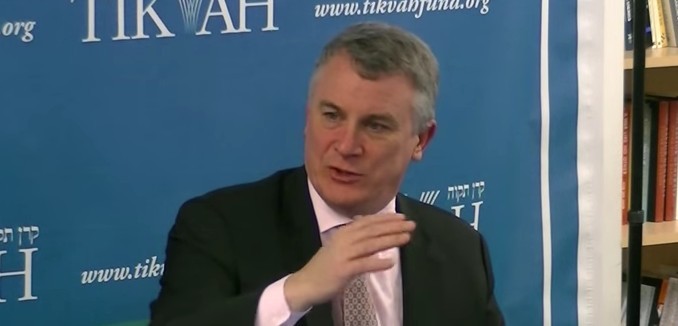Former Bush administration official Michael Doran asserted that a “coercive component” would be essential to convincing Iran to give up its nuclear program in an interview published today with Max Fisher of the online publication Vox.
When asked by Fisher if the goal of preventing Iran from developing a nuclear weapon is acheivable, Doran, now with the Hudson Institute, argued that a “coercive component”—either sanctions or a credible threat of force—was necessary to deter Iran. He dismissed the importance of Iran engaging in negotiation as a sign of any real change, observing, “It’s just proof to me that they want sanctions relief and they’re going to get it, and they see that they’re going to get it, and they will stick with this process as long as they get direct, immediate, and very desirable benefits from it.”
When Fisher pressed about how enforcement could work if Iran was found to be cheating over the course of the deal, Doran termed this question “the crucial one.”
The way the president has set this up, he has incentivized Iran to pocket huge benefits up front. This has put them in a position to be able to go for a bomb when they want in a position of much greater economic strength and diplomatic strength. Because the very process of the negotiation is destroying the sanctions regime we established, which is the greatest nonmilitary instrument we have for coercing them. This is the fundamental flaw at the heart of the coercion strategy.
He’s going to use his waiver authority to free up all this money that is in escrow accounts across the globe that is going to pour into Iranian coffers nearly immediately. At the same time, the United Nations Security Council is going to bless the agreement, which is then going to free up the Europeans and others, including the Russians and the Chinese, to engage in commercial activity with the Iranians. And so we will have effectively gutted the sanctions regime.
Iran’s status in the international community is going to be greatly improved, and then there’s going to be an international commercial lobby and a diplomatic-military lobby, which includes the Chinese and the Russians, in favor of the new order in which Iran is a citizen in good standing in the international community that they can do business with.
Doran explained that the international sanctions regime took effect over time, but once eroded, would be difficult to re-impose: “If a deal is signed this year and then in 2017 they cheat, it would take years and years and years of penalizing them before we could ever get back to the situation we had in 2012.”
When testifying before the Senate last year, Doran argued that new sanctions were needed in order to restore the West’s negotiating position with Iran to the point it had reached prior to the implementation of the Joint Plan of Action in November 2013. Earlier this year, Doran wrote a much-discussed article for Mosaic Magazine, where he argued that the administration sought to empower Iran to help stabilize the Middle East.
The idea of “snapping back” sanctions to punish Iran for violations of a future nuclear deal has been promoted by the administration as a way of ensuring that Iran would not violate the agreement, but an analysis appearing recently the Associated Press found that a sanctions snapback plan could prove to be “unworkable.” Similarly, Olli Heinonen, the former deputy director general of the International Atomic Energy Agency, warned recently that the process of identifying and reacting to violation could take a while making the re-imposition of sanctions unfeasible.
[Photo: Tikvah Fund / YouTube ]




